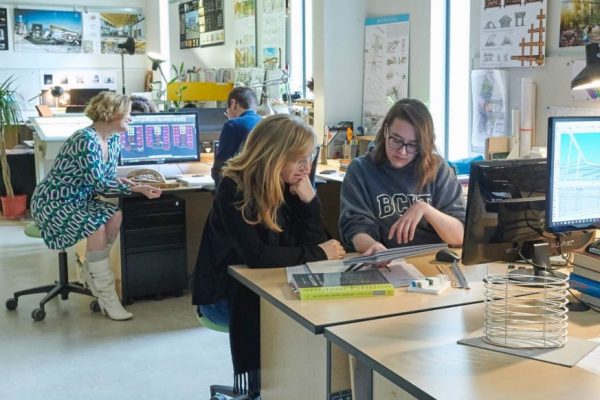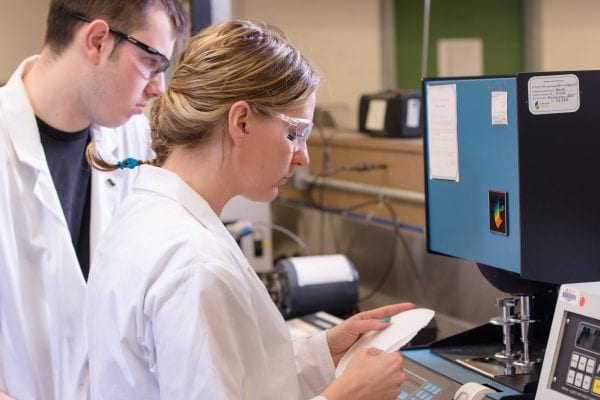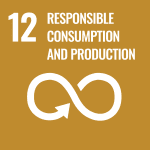
SDG 12 highlights the need for resource efficiency and adopting sustainable procurement policies. It includes the management of harmful wastes and chemicals in a way the reduces their negative impact on the natural and human world. On a social level, SDG 12 is a call to action for humans to build sustainable lifestyles that are in harmony with nature, and to build green jobs that promote local cultures, experiences and products.
BCIT’s Sustainability Policy 1010 [PDF] emphasizes our aspiration of being a zero waste organization. As part of the application of this policy, BCIT aims to improve, monitor, and report on its performance in sustainability when it comes to the procurement of goods and services, as well as facilities management and waste management.
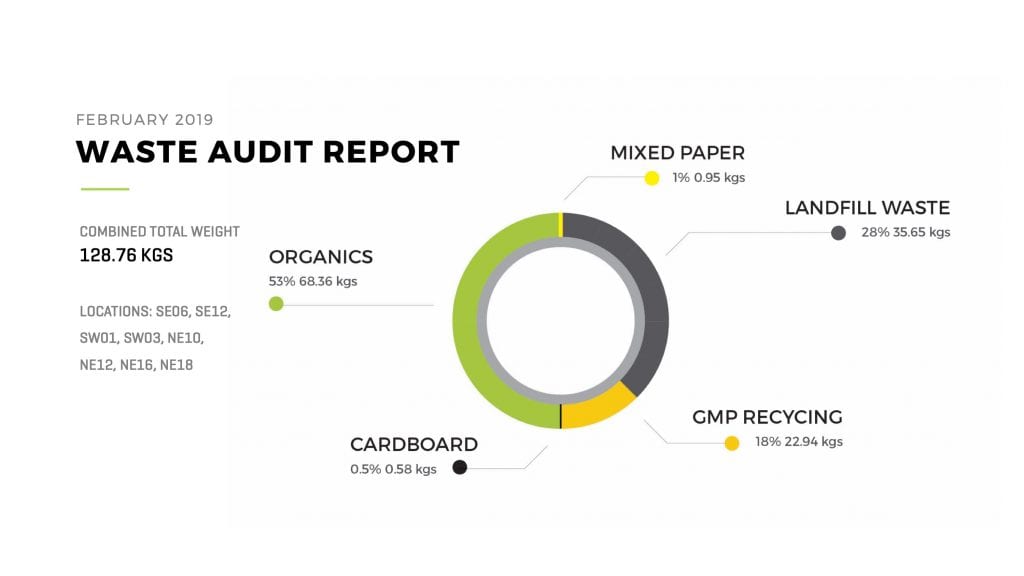
We recognize that at the forefront of this challenge is our approaches to managing waste. Campus wide waste audits are conducted every few years to identify the amount of total waste collected and diverted from landfill or incineration. These statistics are used to track our program’s effectiveness and to ensure compliance with Metro Vancouver’s waste management guidelines.
When reflecting on SDG 12, we understand the key role that reducing, repurposing, reusing and recycling plays in our campus operations. However, we further recognize the importance of addressing our overall ecological footprint and the role we have to play in encouraging our community to do the same.
Education & Research
Dr. Sudip Talukdar is an Instructor and Program Coordinator in the Civil Engineering Department at the BCIT School of Construction and Environment. His interests and expertise fall within the fields of construction materials and structural engineering.

In 2020, Dr. Talukdar conducted research on hemp waste in tandem with the Department of Civil Engineering at the University of British Columbia, and Nextleaf Solutions. Specifically, his work explored hemp waste valorization as biofuel cement replacement.
The growing interest in industrial applications of the hemp plant requires alternative solutions for disposing of hemp waste. At the same time, the concrete industry is seeking ways to reduce its environmental impact, which could be realized by partially replacing Portland cement with more sustainable materials. In this study, researchers explored a two-step valorization strategy of hemp waste. This included the use of hemp waste as biofuel and the addition to concrete of the biofuel by-product, hemp ash, as partial cement replacement.
Results of the study showed that hemp ash has the potential to be added to concrete as a filler to reduce environmental impact and costs at 5% cement replacement. This contributes to the environmentally-sound management of waste, as well as material recycling.
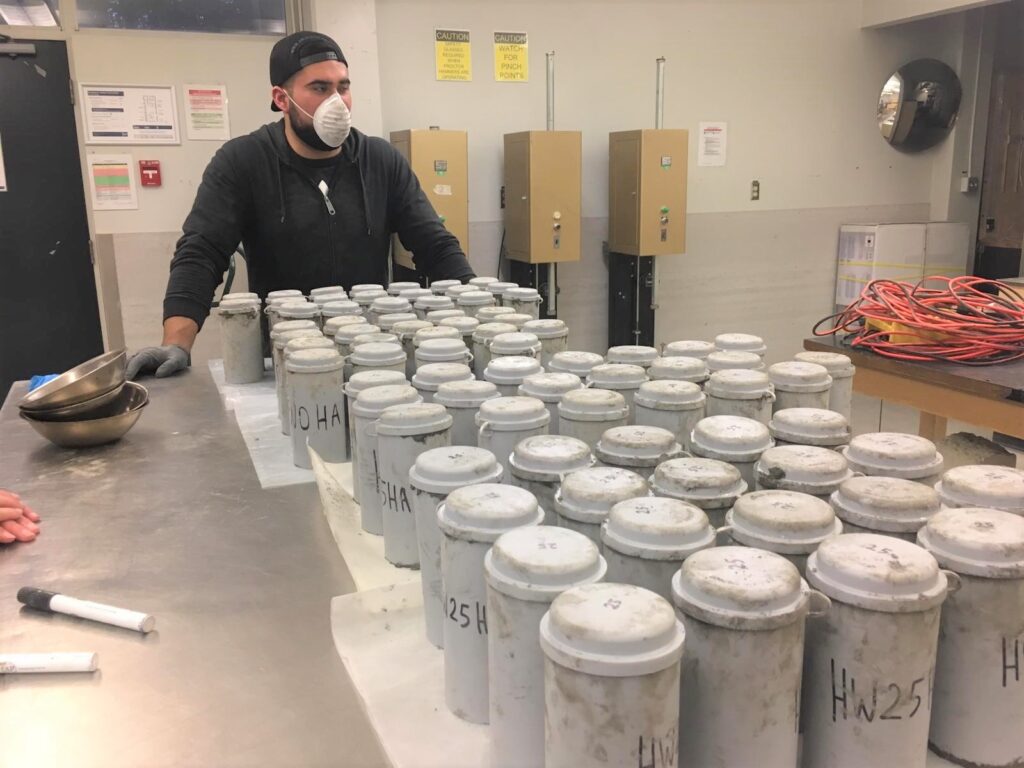
Under the Supervision of Dr. Helen Heacock, Faculty within the School of Health Sciences, Shawn Davis, a Bachelor of Technology student, conducted a study on the interest of Metro Vancouver in returnable and recyclable container programs (RRCP).
As the interest in delivery and take-out meals increases, so too does the amount of food packaging that ends up in landfill. Programs and incentives are in place in British Columbia, which continue to be adjusted to encourage the reduced reliance on these materials. Davis’ survey of British Columbians showed support for an RRCP regardless of other variables (age, gender identification, location, or take-out and recycling habits). Despite limiting responses, the study showed that the public is interested in reusing food containers for take-out meals and the introduction of RRCP’s should be explored further.
This study explored consumer preferences towards reducing and recycling habits, and highlighted the many complexities of food waste in urban areas.
Biochar is a soil amendment that is highly rich in carbon, whose positive effects in forest management continue to be researched.
At BCIT, Civil Engineering, Ecological Restoration, Chemical and Environmental Technology, Chemistry students teamed up to research the effects this material may have in removing chemical contamination from stormwater to improve water quality in creeks and rivers.
For more information on this research, please see SDG 6: Clean Water and Sanitation.
The Natural Sciences and Engineering Research Council of Canada (NSERC) provides Undergraduate Student Research Awards (USRA) to students in natural sciences and engineering.
NSERC is the Canadian federal research funding agency mandated to promote and support postsecondary-based research and training in the natural sciences and engineering. Research priority areas include Environmental Science and Natural Resources.
These awards provide students with financial support of $6,000 for a full 16-week period. BCIT supplements the amount of the award by at least 25% of its value.
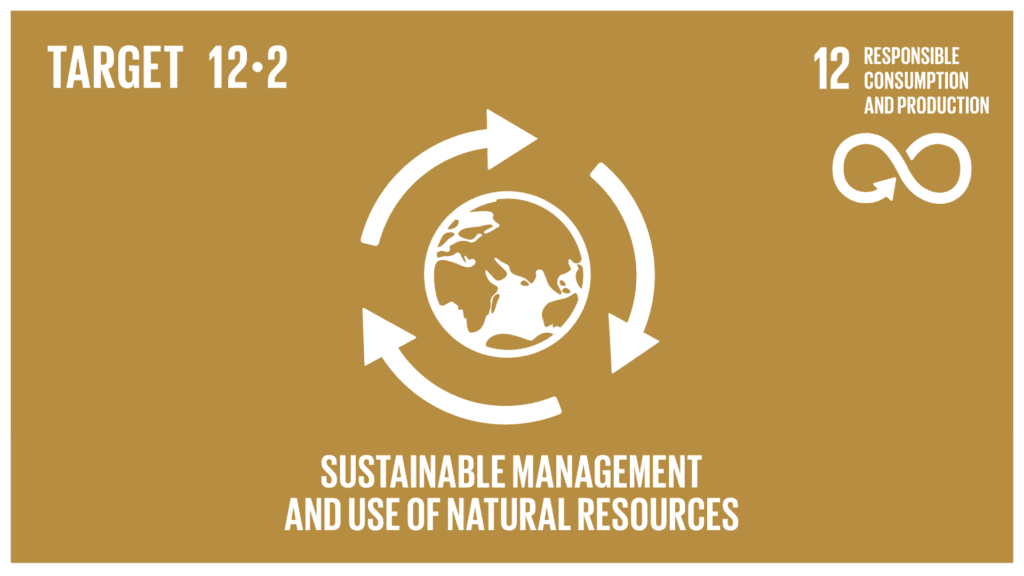
The Sustainability Office and Corporate Services Department collaborated with students from the Advanced Diploma on Sustainable Business Leadership, a one of a kind program in British Columbia, on a Capstone Project that investigated different possible food service ware options for our Institute’s facilities.
The project largely included research on sustainable single-use and reusable service ware.
The goal of this report was to aid BCIT Food Services, Operations, and the Sustainability Office in making an informed decision regarding their procurement practices based on an analysis of financial, environmental, and operational considerations. In order to gather this information, the student team conducted secondary research, key informant interviews, surveys and observational research. The project provided key insights and recommendations to BCIT regarding approaches to single-use products on campus.
Engagement
CityStudio Vancouver is an innovation hub that brings together city staff, students, faculty and community to co-create experimental projects that make Vancouver more sustainable, liveable, joyful, and inclusive. Every year, BCIT collaborates with CityStudio on projects that further Vancouver’s strategic aims. As of spring 2021, 1,197 BCIT students have worked on over 200 projects in collaboration with CityStudio.
The Safe Sharp Disposal and Education Project (Be Smart with Sharps) is a joint, interprofessional applied program (IAP) between BCIT Business and Nursing students. The two teams worked together to uncover solutions regarding safe sharp disposal and education in Vancouver. The students collaborated with both the City of Vancouver and Vancouver Coastal Health (VCH) on this project.
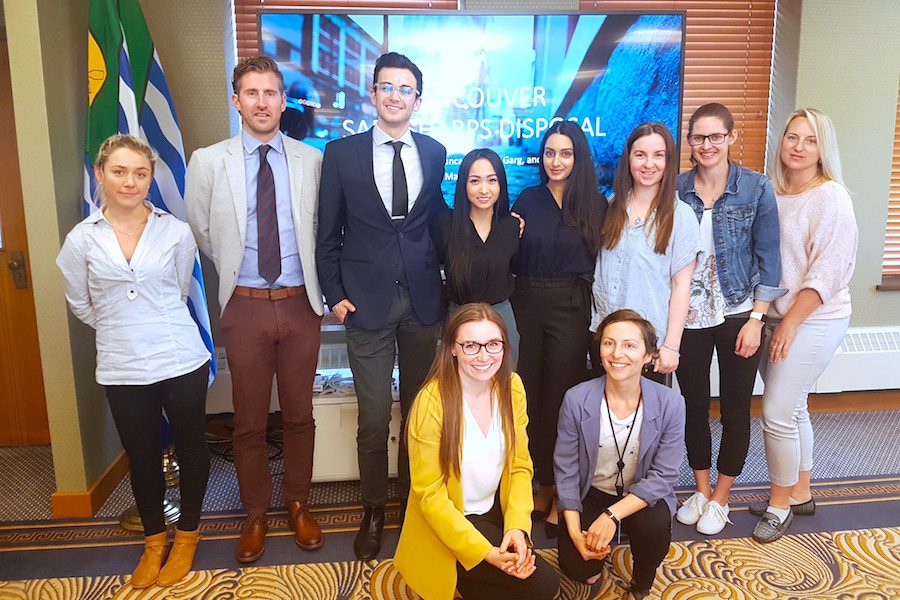
For the project, students conducted and analyzed three phases of secondary, qualitative and quantitative research. Secondary research was conducted to identify critical influences of the stigma around discarded sharps, the level of risk to the general public, and both past and current sharps disposal initiatives from the City of Vancouver and other cities. Public opinions from non-intravenous drug users (IVDU) about discarded sharps and IVDUs were additionally consulted, followed by an online survey to gather quantifiable data.
At the end of the research phase, the research findings were used to compose recommendations. In addition to the research report, BCIT Business and Nursing students used their partnership to create a Safe Sharp Disposal Educational Plan [PDF].
BCIT Marketing Management students collaborated with CityStudio Vancouver on a project to foster Vancouver’s market for salvaged materials. The students conducted research to provide the City of Vancouver’s Zero Waste 2040 Strategy with an in-depth understanding of the current market and the potential it has to grow over the next two years.

The research conducted by this group was used to develop a two-year marketing campaign that the City of Vancouver’s Greenest City Action Plan can implement to educate consumers on salvaged materials and change consumer preference to increase the uptake of salvaged materials in the local market.
See the project report featured on the CityStudio website.
The Smaller Bin, Smaller Footprint initiative was launched by Facilities Services. This program encourages staff and faculty to reduce their waste by swapping the regular-size trash can in their office with a mini-trash bin. Just how small are these bins? About the size of a regular tissue box.
In an office environment, 85 percent of the waste produced could be recycled (mainly paper) and only 15 percent should end up in the landfill. This means, the trash bins used in campus office spaces should really be six times smaller than your recycling bin.
By switching to a mini-trash bin, we not only lighten our carbon footprint but also save money. Regular-size trash cans use plastic-bag liners which are not eco-friendly and end up in a landfill. However, the mini-trash bins do not. Through the switch the smaller bins, faculty and staff help eliminate the Institute’s need to buy and use these liners.
Administration & Operations
BCIT has a comprehensive recycling, composting, and waste management program that diverts over 70% of our waste materials from landfill. In recent years, our program has seen a 12% reduction of total waste generated on-site and a 25% increase in our diversion rate. Beyond reduction and reuse initiatives, waste diversion is critical to meeting waste reduction objectives because diversion “recovers” materials from the waste stream through recycling and composting.

Recent waste management initiatives include:
- Bulk ordering of custodial supplies reduced deliveries to quarterly from a monthly basis in 2020.
- Installation of 20 additional 4-stream recycling stations to corridors and public areas, and 5 exterior 3-stream recycling stations in 2020.
- Introduction of 277 sanitary disposal receptacles where all waste goes to waste-to-energy conversion. Through this process BCIT is able to reduce monthly waste by roughly 800lbs, while generating 216 kW of power.
Learn more about recycling and waste at BCIT and the bins you can find on campus.
The BCIT Bookstore has teamed up with Textbooks For Change, who sends 50% of donated textbooks to partner campus libraries in Africa. Approximately 20% are resold at affordable prices to students, funding initiatives on local campuses. Any out-of-date, damaged, or unusable textbooks are recycled. Donation keeps textbooks out of landfill.
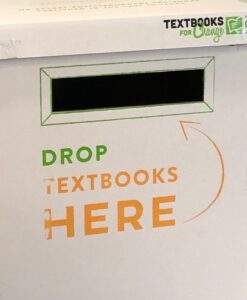
Accepted Items
University and college textbooks published in the last 15 years.
Not Accepted
High school books, loose leaf texts, course packs, magazines, academic journals, badly damaged books, or entertainment books.
Donation Bin Locations
SE2 Bookstore – foyer
NE9 Bookstore Annex – hallway
In pursuit of reducing greenhouse gas emissions, showcasing environmentally-sustainable projects for widespread use, and incorporating sustainability more broadly in curriculum, BCIT has created a closed-loop biomass district energy system.
The system uses wood waste from lumber cut offs generated from the BCIT Carpentry and Joinery programs, as fuel for a biomass boiler. Learn more about the Wood Waste to Energy Project at the SDG 13: Climate Action page.
BCIT has switched to Sugar Sheet paper for roughly 85% of its paper purchasing. This marks a major step for our Institution’s aspiration of becoming zero waste, where we rethink, reduce, reuse, recycle, and eliminate.
Sugar Sheets are manufactured using the waste fibre generated from sugar cane processing and use no wood unlike most paper products. Created by Social Print Paper, a local company based in New Westminster, BC, the goal of this alternative is to minimize dependency on global forests to make paper. According to a report published by Trucost in 2017, greenhouse gases associated with the product life of Sugar Sheets are 55% lower than uncoated wood-derived paper with no recycled content, and 29% lower than uncoated wood-derived paper made entirely from recycled pulp.
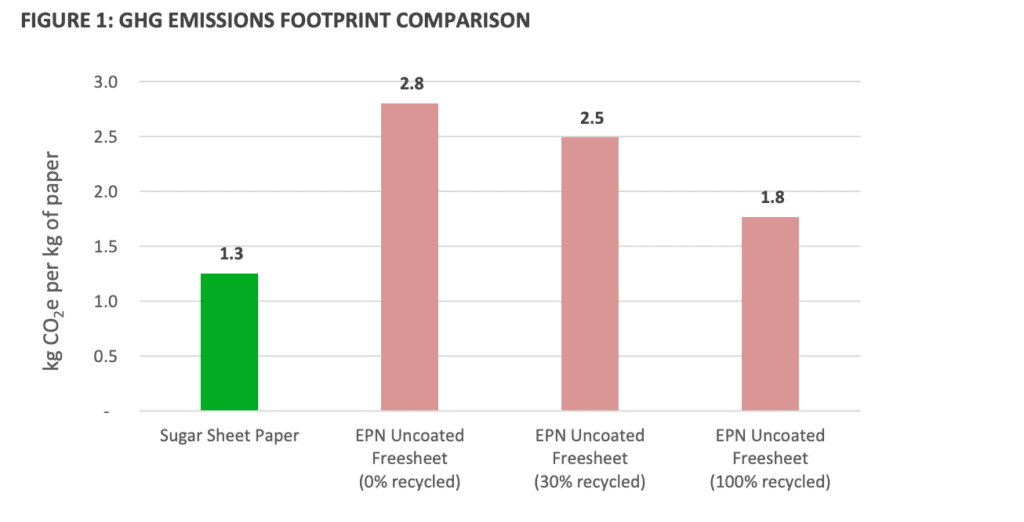
In 2016, BCIT started replacing older water fountains with new fountains with water refill features in an effort to reduce waste from single use disposable bottles. There are many negative effects from the use of single use plastics, and any effort made by the BCIT community to use the water refill stations is greatly appreciated.
